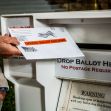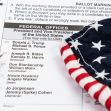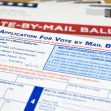This year, the U.S. Presidential election contends with a tensely polarized nation and electorate, an ongoing global pandemic, foreign interference, and mail-in voting controversies that threaten to tarnish the shining face of the USPS. The current president has been mentally prepping the country for months—perhaps even years—to expect foul play in November.
“With Universal Mail-In Voting (not Absentee Voting, which is good), 2020 will be the most INACCURATE & FRAUDULENT Election in history,” Trump said on Twitter. “It will be a great embarrassment to the USA.” Trump supporters appear convinced that Democrats will attempt to steal the election with fraudulent mail-in voting; Democrats, on the other hand, allege Postmaster General Louis DeJoy is attempting to hamstring the postal service, while also pointing to Russian interference and Trump’s commentary about remaining in office.
A bipartisan organization called the Transition Integrity Project came together with over one hundred experts, including academics and both past and present senior government officials, to play out a series of “war games” for the upcoming Presidential election. The group’s creation and its data-based forecasts are staggering. The hypothetical, seemingly far-fetched musings about November have shifted to genuine concern. The election results are already in question, threatening the democratic process long before the polls even open.
“With the exception of the ‘big Biden win’ scenario, each of our exercises reached the brink of catastrophe, with massive disinformation campaigns, violence in the streets and a constitutional impasse,” Rosa Brooks wrote for the Washington Post. Brooks is a member of the Transition Integrity Project as well as a former Pentagon official and Georgetown University law professor.
Biden has already begun much of the preparation needed for a smooth, typical transition into office. The Presidential Transition Act ensures an incoming administration can streamline the logistics so that the power can change hands and new policy get implemented without confusion. As is typical, Biden and his team have prepared extensively for the prospect of the presidency. Meanwhile, however, the sitting president has ridiculed that possibility, reiterating that there is no chance of Biden’s victory—even if the election results say so.
The last time Presidential election results came under a level of scrutiny comparable to today’s, the U.S. Supreme Court stepped in. It was November 7, 2000, when George W. Bush and Al Gore faced off for the presidency. The race came down to Florida, in which state election law required a recount for such close results.
All states must abide by federal election laws, but each governs within its borders with statutory law dictating elections. For one, the Constitution says the electorates should be selected by each “state executive,” which could be the governor or another official, depending on each state’s legal specifications. Some hypotheticals suggest that the election might fail on account of these executives refusing to certify enough electors to constitute a majority win in November.
When Florida statutory law demanded a recount in 2000, it turned out that tens of thousands of the state’s ballots had been disregarded. Yet, the Supreme Court put a halt to the recount.
In Bush v. Gore, the Court ruled that Florida’s voting and counting procedures violated the Fourteenth Amendment’s Equal Protection Clause by maintaining inconsistent vote-counting standards throughout the state.
“Although we may never know with complete certainty the identity of the winner of this year’s Presidential election,” Justice John Paul Stevens said in a dissent, “The identity of the loser is perfectly clear. It is the Nation’s confidence in the judge as an impartial guardian of the rule of law.”
The Transition Integrity Project suggests the judicial branch may remain on the sidelines this year, not wanting to interfere with issues perceived as too political to fall within the Court’s authority. When the justices dissented in Bush v. Gore, they worried the Court was overstepping an issue that Congress may be responsible for. Even if it did step in, there’s “no guarantee that the losing side would accept a ruling from a highly politicized Supreme Court,” Brooks said. Instead, a fight may play out in the legislative branch.
The 2000 election case was unanticipated and, overall, an issue centered on statutory counting and voting procedures. Twenty years later, Florida has installed new ballot machines, but the country as a whole is showing symptoms that could be detrimental to the upcoming election. The primaries and caucuses this year have been an extensively poor example of voting safely and effectively during a pandemic—some places were terrible examples of voting at all, even without factoring in that COVID-19 is still nipping at the nation’s heels. With the additions of the mail-in voting hurdles and foreign interference, this election will likely provoke a magnified version of the 2000 storm.
If the decision does fall to Congress, this is probably how it would play out: first, the anticipated hurdles complicate the election results—perhaps foreign interference is suspected, or Trump insists rampant fraud has been discovered in the ballots from blue states, etc. A few of the “state executives” responsible for certifying the electors might then refuse to do so, leaving both Biden and Trump without a clear majority in the Electoral College.
What happens next, according to the Constitution’s Twelfth Amendment, is for the House of Representatives to “choose immediately.” Each state would have one vote to decide the presidency. But it is unclear which Congress would actually wield that power. Senate Majority Leader Mitch McConnell could assert that no previous Congress has the power to “bind” a future Congress, and the Supreme Court might have to rule on which legislature is constitutionally responsible for casting the vote. Then, it would be up to the House of Representatives to decide how to apply this power.
Though the House is Democrat-led, there are currently enough sitting Republican members to award the majority to Trump. In this situation, Biden would need to see an increase in Democrats in the House to secure victory; additionally, the Court would have to ensure that the new Congress, not the current one, is responsible for the vote.
In an ideal world—the kind democracy was designed for—each representative would undoubtedly honor their constituents by adhering to each of their states’ popular votes, even if the consequence conflicts with their own political alignment. In reality, we can only hope for such impartiality in our democratic process.
The Supreme Court’s ruling in Bush v. Gore kept the election dispute out of Congress in 2000, avoiding the constitutional crisis that could ensue today: if the country believes the election results are illegitimate, neither side will accept the results. The judicial branch, in particular, depends on public opinion, and it will be risking its sacrosanct image of legitimacy if forced to weigh in.






